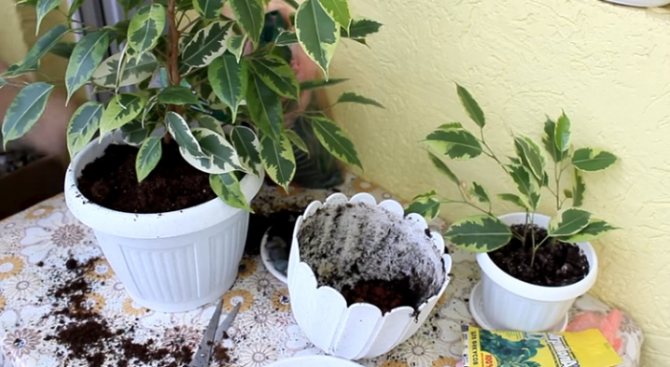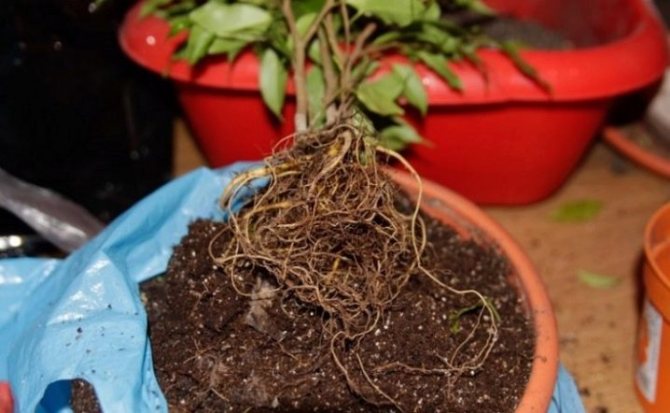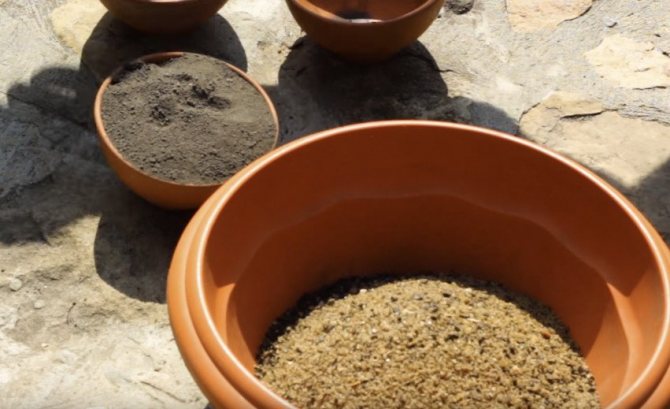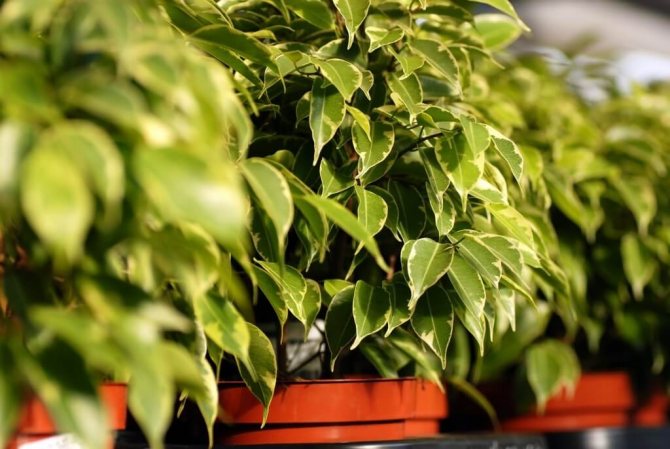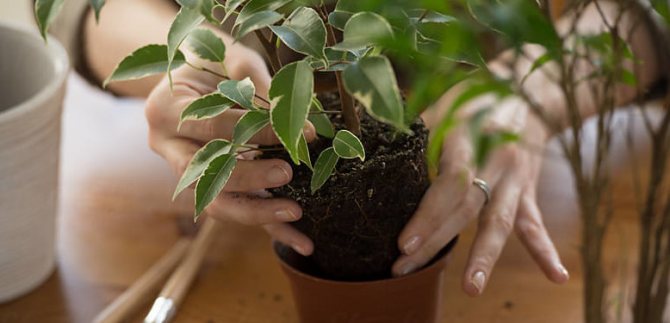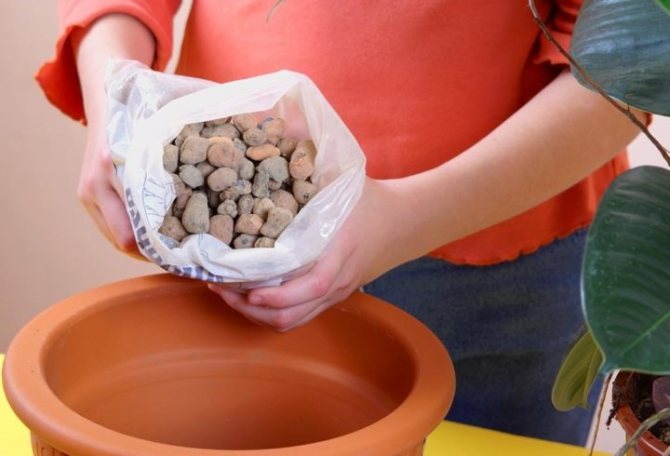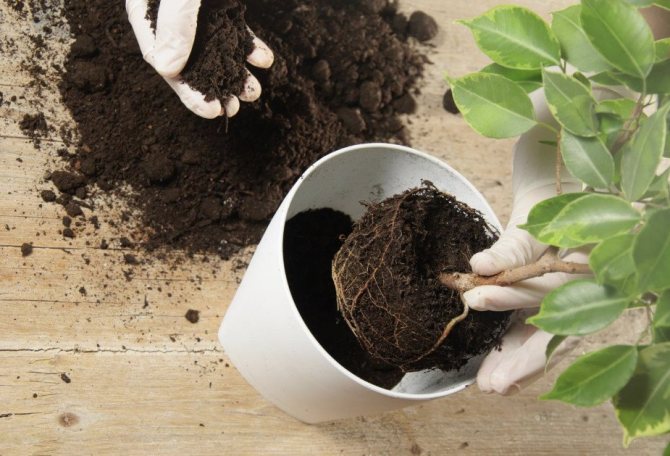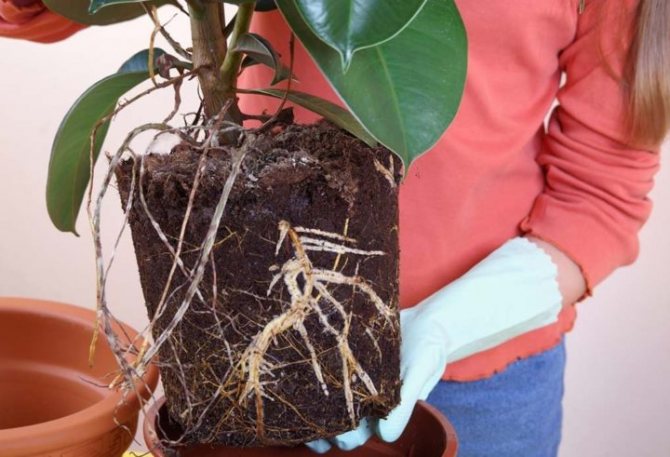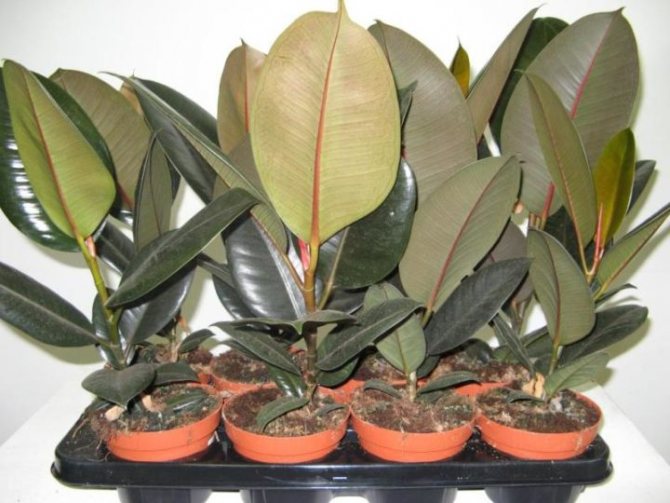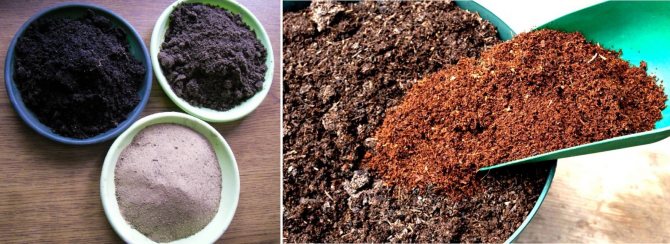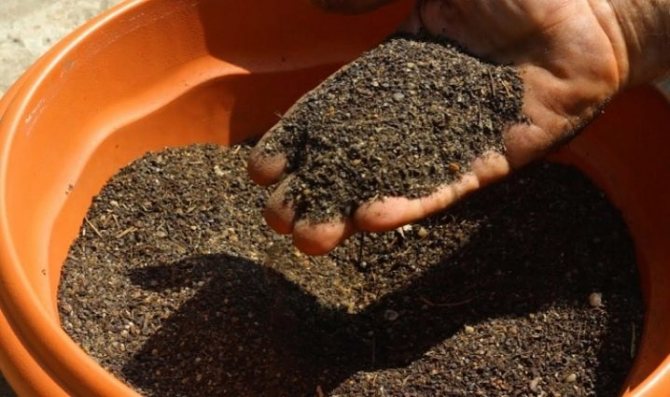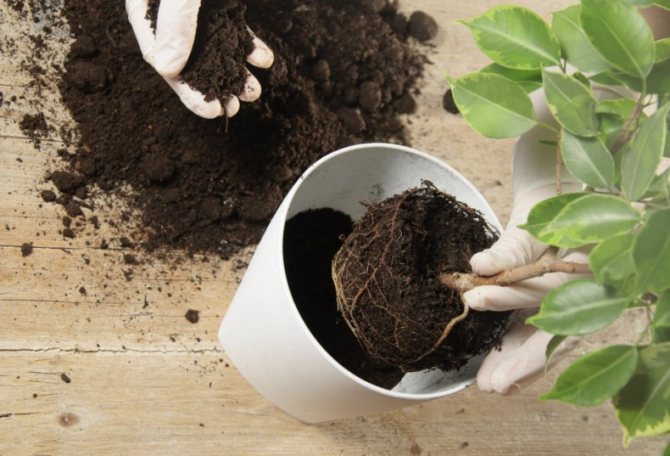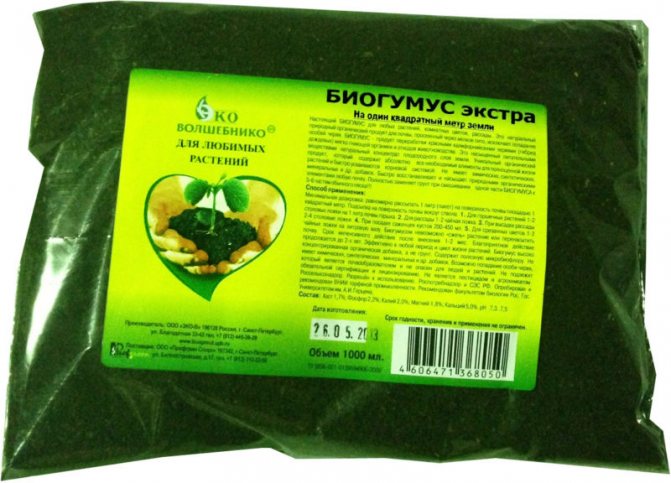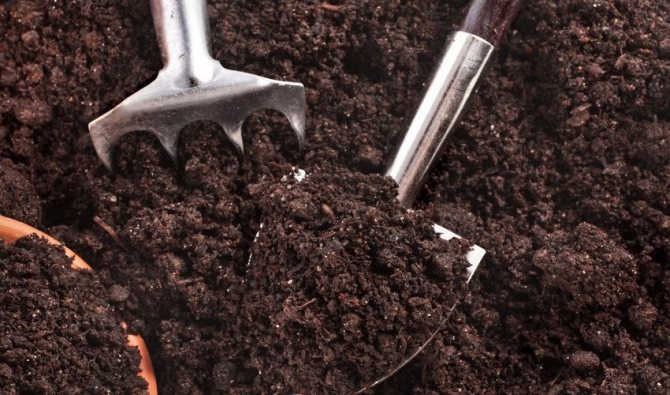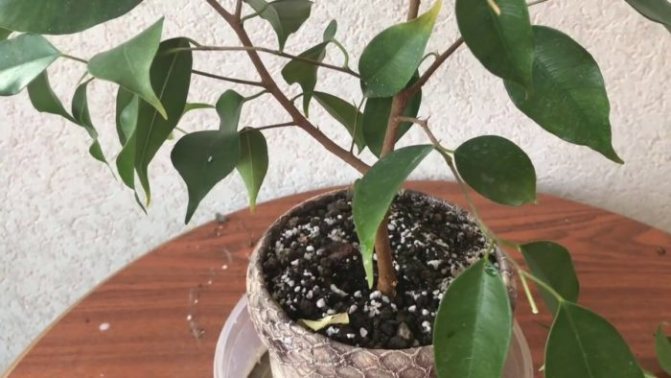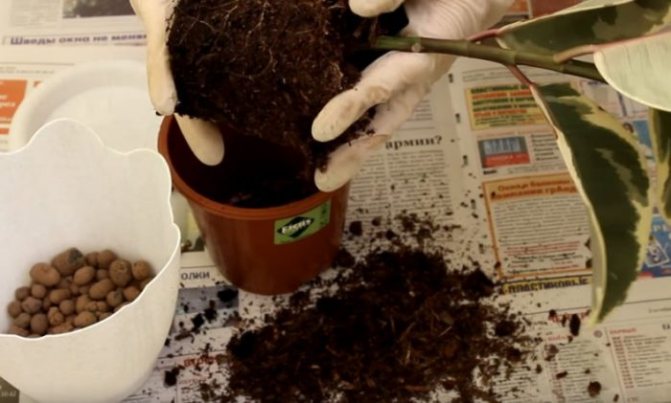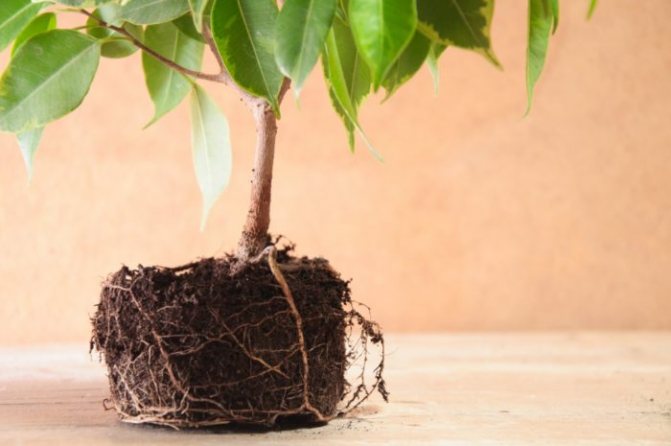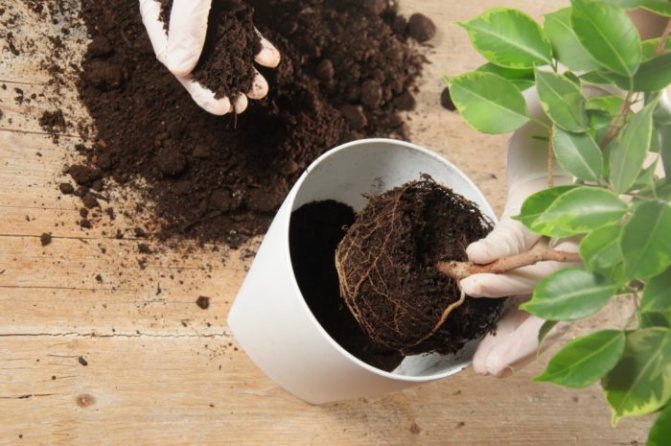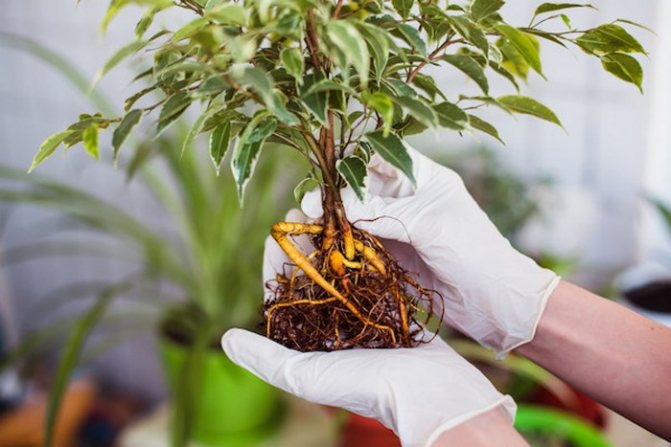"Flowers" What soil to choose for ficus - recommendations of florists
0
10
Article rating
When growing Mulberry, flower growers attach an important value to the composition of the substrate. Ficus soil is the key to full development. The life expectancy and decorativeness of an indoor flower directly depends on the correctly selected soil.
What soil to choose for ficus - recommendations of florists
Primary requirements
For full development and growth, the plant requires high-quality fertile soil. Ideally, the land for ficus should have the following properties:
- breathability;
- moisture permeability;
- suitable acidity;
- optimal structure.
Household ficuses prefer moisture and air permeable soil, rich in useful micro and macro elements. At the same time, the concentration of nutrients in the soil should be optimal.
Excess nitrogen, phosphorus and potassium can weaken the plant's immunity, cause deformation of its leaves and shoots.
Indoor ficuses painfully tolerate waterlogging of the soil. If water stagnates in the pot, the roots will start to rot, which will lead to the death of the plant. The soil for the ficuses must be well drained. - this will provide full circulation of moisture and air at the roots.
Ficuses need a neutral or slightly acidic soil with acidity parameters of 6.5-7 pH. Acidic soils are not suitable for these plants.
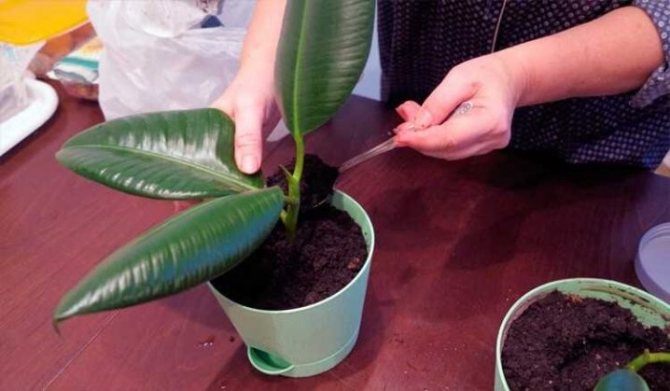
When choosing a soil for the described plants, you should pay attention to the structure of the mixture. Loose, not too dense soil containing organic nutrients is ideal. It is good if the composition contains sand, which will provide the substrate with airiness, air and moisture permeability.
It is important to note that in dense clay soils, domestic ficuses do not feel well, they noticeably lag behind in development and growth. High clay content impairs soil drainage, which inevitably leads to waterlogging and stagnation of water at the roots. This, in turn, leads to decay of the root system and the appearance of pests in the substrate.
Experienced growers recommend paying attention to its age when transplanting a plant. It is one of the criteria for choosing a suitable soil. So, it is advisable to plant young ficuses in loose and light soil. Older plants are best suited for soil with a denser structure.
Improving the moisture and air permeability of the soil allows drainage, which is laid on the bottom of the pot before planting the plant. River pebbles, crushed expanded clay, pieces of foam plastic, fine clean gravel are used as drainage.
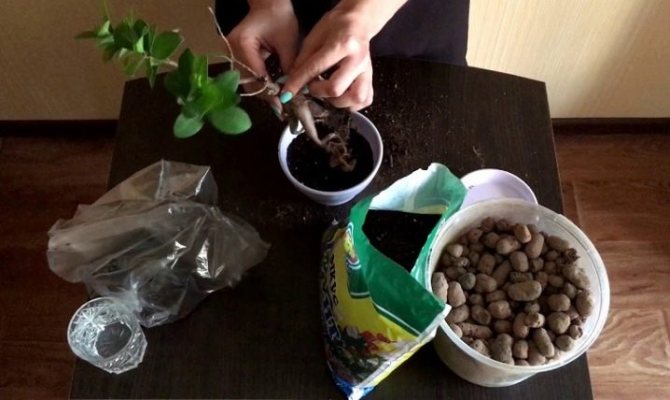

Drainage
Ficus is a plant that does not like swampy soil. Any excess moisture negatively affects the root system, and prolonged stagnation of moisture can lead to decay processes. That is why special attention should be paid to the drainage system, which removes excess water from the root system.
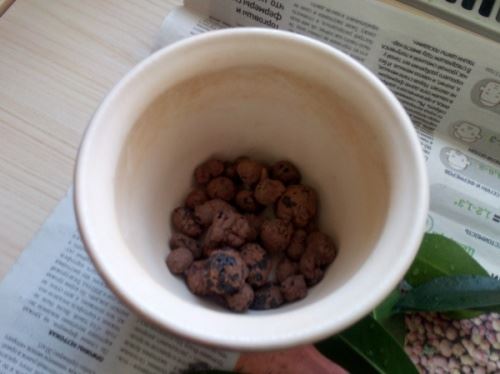

Drainage for ficus
As a rule, in flower pots, such a system is simple: at the bottom of the pot, a dense layer of 3-7 cm is formed. A pillow of expanded clay or pebble balls is formed.
Coarse river sand is poured from above to the level of complete overlap, filling the empty space.
The prepared soil is poured from above, if necessary, compacted. Now, during irrigation, water, having saturated all layers, will not accumulate at the bottom, but will leave the pot with the help of the drainage system.
Tip: A high moisture content can lead to the appearance of 1-2 mm long white worms in the upper layer. They can be destroyed with different types of insecticides: Agara, Intavira, etc. But the best solution would be to transplant the plant and monitor watering more closely in the future.
DIY soil for ficus
In modern gardening stores, you can find a wide range of ready-made soil mixtures for ficuses. Their main components are usually the following components:
Some manufacturers enrich their soil mixtures with various nutrients - organic matter and mineral complexes. Such additives significantly extend the life of the substrate.
To make a soil mixture for a young ficus on your own at home, you need to mix turf, peat, sand and deciduous humus in equal proportions. To improve soil drainage, coarse sand is preferable. It is also allowed to add a small amount of crushed charcoal to the mixture. It will not only add airiness and lightness to the soil mixture, but also create a protective environment that prevents the emergence and development of pathogenic bacteria.
When preparing a soil mixture for adult plants, experienced flower growers recommend using two parts of fertile land, two parts of deciduous humus and one part of sand. This composition has a moderate density, suitable for adult ficuses with a strong and developed root system. If the soil mixture eventually turns out to be too dense, it is allowed to add drainage elements into it - small stones, expanded clay, pebbles.
Popular brands of ready-mixed mixtures
Among modern manufacturers offering consumers ready-made soil mixtures for ficuses, florists mark the following brands:
- "Garden of Miracles" Is a brand offering quality balanced ficus soil. Its main components are peat, vermicompost and sand. To enhance the nutritional properties of the mixture, the manufacturer enriches it with complex mineral additives.
- "Vermion" - under this brand, a nutritious soil mixture with an optimal acidity level is offered. The main components of the mixture are peat, ash, dolomite flour, vermicompost and fine fractions of expanded clay.
- "Flower happiness" - a trade mark under which a ready-made soil mixture for ficuses is produced, enriched with trace elements and minerals. Its basic components are high-moor and lowland peat, dolomite flour, and sand. Auxiliary components of the mixture are mineral additives and expanded clay fractions, which ensure good drainage of the substrate.
- "Veltorf" Is a well-known brand that offers consumers a special peat mixture for growing ficuses and palms. Nutritious soil of this brand consists of a mixture of peat of varying degrees of decomposition, river sand and limestone flour. To enrich the nutritional properties of the mixture, the manufacturer includes superphosphate, ammonium nitrate and a complex mineral supplement.
- "Seramis" Is a very popular trade mark among flower growers, producing a wide range of soil mixtures and soil improvers. The ficus soils offered under this brand are balanced and enriched with nutrients as much as possible. An important component of these soil mixtures is a unique clay granulate, which provides full access of air and moisture to the roots.
Soil requirements
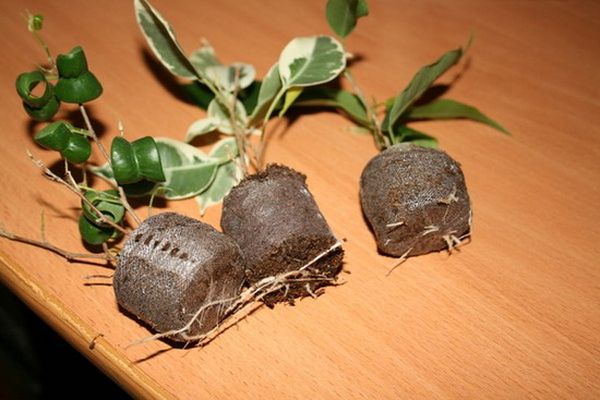

For ficus Benjamin, there are no special requirements for the land, the main thing is to remember that he loves fertile soil.Therefore, the soil must have the following properties:
- rich, high-quality composition, with all the necessary macro- and microelements;
- breathability is an important aspect for the root system of any green space;
- water permeability. Indoor ficus is sensitive to wet soil, and if this property is neglected, then parasites can grow in the ground;
- the acid composition must be neutral, as an exception, slightly acidic soil is suitable.
When transplanting, it is very important to pay attention to the age of the plant, since a looser soil is needed for a young flower, and dense for an adult. The splendor of your flower, the splendor of the crown, and the rich color of the leaves depend on what kind of soil for the ficus will be chosen when planting.
Soil for ficus Benjamin
The soil for Benjamin's ficus should contain equal parts of humus, leafy soil and peat. If the plant is planted in a purchased universal mixture or mixture for ficuses, it is worth adding a baking powder to it: river sand or small pebbles. If the plant has just been purchased, then it is worth giving it up to 3 weeks of time to adapt to new housing, and then transplant it into fresh soil. After that, there may be a partial loss of leaves by the flowerpot, however, if the transshipment was carried out carefully and correctly, and the plant did not suffer, then this process will not last long, and the deciduous cover will quickly recover. Still, moving and replanting a plant is a lot of stress.
How to cook yourself
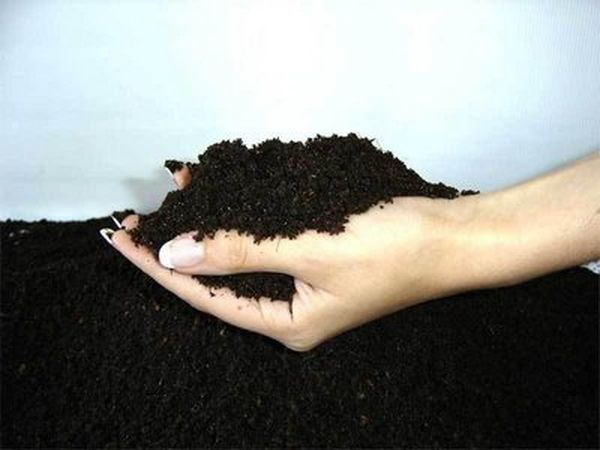

To independently prepare a mixture for an indoor flower, you must adhere to simple rules.
For a young plant, the composition of the soil will include three components with the same proportion: peat, sand and deciduous humus. For an adult ficus, sod land will act as an additional component.
In order for the composition to acquire looseness and the soil to become ideal for ficuses, expanded clay, humus, dolomite and charcoal are added to the pot. Expanded clay is needed not only for the roots to breathe, it has a unique quality - it absorbs minerals and gradually shares them with the plant. Thanks to humus, indoor flowers grow faster and, after planting, take root less painfully in new living conditions. Planting a flower without dolomite is not at all recommended, since it is it that reduces the level of acidity of the soil, and also enriches the earth with magnesium and calcium, which indoor flowers are so fond of. Wood ash in this mixture acts as an additional source of phosphorus, potassium and trace elements.
Buy or do it yourself
Experienced growers are advised to give preference to the soil prepared with their own hands. They argue such recommendations by the fact that in this way we can completely regulate the composition of the soil, adjusting to the individual characteristics of our green friend (age, variety).
Ficus is one of 10 indoor plants that are useful to keep at home. In addition to it, useful properties are also distinguished: chlorophytum, aloe, geranium, laurel, Kalanchoe, chrysanthemums, cactus, pelargonium, sansevieria.
It is quite simple to prepare such a mixture, the difficulty is only in finding all the necessary ingredients. Plus, preparing the soil for most indoor plants by hand is a rather laborious process. But it allows you to enrich the soil with exactly those substances that are necessary for a particular plant at a certain stage of its development.
Despite the versatility of store-bought soils and the inability to adjust their composition with your own hands, such mixtures also have their advantages. Almost always, they include a complex of mineral fertilizers necessary for the development of the plant.Therefore, if there is no opportunity to prepare all the necessary components for preparing the soil at home, feel free to give preference to soils from the store. The plant will not suffer from this.
Important! In new conditions, ficus takes some time to adapt. It is recommended to transplant a flower at least 3 weeks after its purchase.
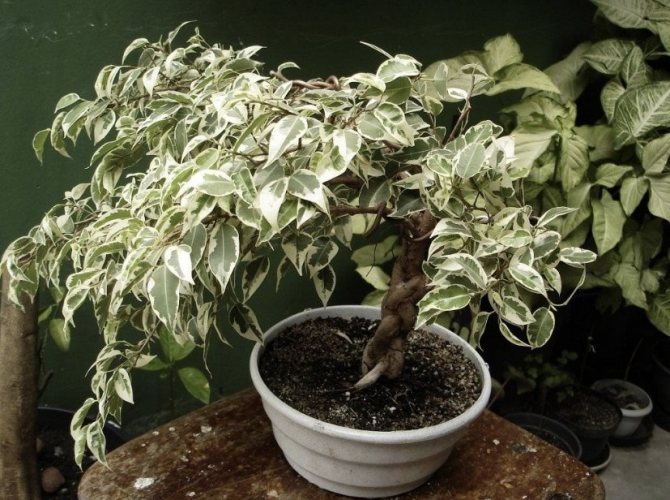

Types of store soil
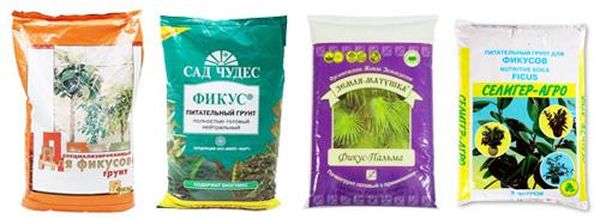

If you are a novice florist and do not know what kind of soil and with what composition you should buy, then a consultant in a specialized store can easily select the necessary soil mixture. It can be universal or consist of the necessary components specifically for indoor ficuses, but they do not fundamentally differ in their compositions. If your choice falls on the universal composition of the earth, then be sure to add sand there.
On any packaging, the manufacturer will necessarily indicate all the components that make up this mixture, therefore, knowing the composition, you can choose additional additives that are used immediately at the time of planting or already in the process of growing.
What soil to choose to plant your favorite plant is an individual matter. However, do not forget that purchased soil or prepared by one's own labor still needs chemical treatment before use, otherwise there is a chance to infect the flower with parasites. If it suddenly happened that small white worms appeared in the ground, you should not immediately panic, these are ordinary mushroom mosquito larvae. Try to get rid of them with the help of medicinal granules, mixing them with the soil, but if this does not help, then use the advice above and transplant your ficus into a more suitable type of soil.
Video "Ficus transplant"
From this video you will learn how to transplant ficus yourself.
Ficuses are not too demanding on the soil, but to get really luxurious plants - with healthy shiny leaves and lush greenery, you need to know that they prefer fertile soil, with good water and air permeability, slightly acidic or with a neutral level of acidity.
Ficus roots are very sensitive to the presence of moisture in the soil, its excess is especially detrimental to them. Therefore, soil with a clay structure is definitely not suitable. There are species of ficuses that, in the wild, grow on rocky ground ("bottle"), so it is good to add small pebbles or brick chips to the soil mixture for them. The composition of the soil also depends on the age of the plants. For the young, it should be looser. The required density of the soil mixture for adult ficuses is achieved by adding turf or humus.
Structure
What composition of the earth should be in order for the ficus to feel good and grow well, we slightly touched on in the previous paragraph. It is noted that the following soil composition is best suited for such indoor plants:
- deciduous land;
- light sod land;
- heavy sod land. When using this component, add humus and sand.
Usually, all these components are taken in equal parts. In addition, depending on the variety and age of the bush, the following components can be added to the soil mixture:
- peat;
- compost flour;
- rotted manure.
To achieve greater looseness of the soil, which is important for young flowers, the composition of the soil may contain the following elements:
- expanded clay;
- charcoal;
- coarse sand;
- expanded clay gravel.
These components help to increase the air permeability of the soil mixture prepared by your own hands, and they are also able to absorb nutrient solutions and excess moisture like sponges. Expanded clay in this situation will be the best choice. After absorbing moisture, it is able to share its water reserves with the root system.
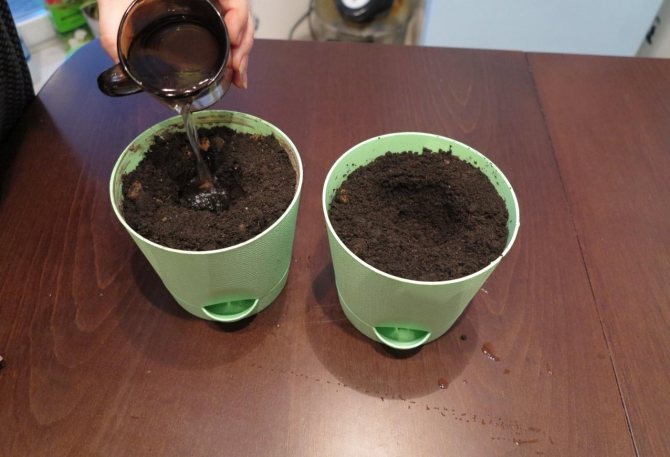

In addition, for some varieties, vermicompost is needed for normal growth and development. It is produced by earthworms.It can simultaneously act as a soil component and organic fertilizer. Vermicompost has the following properties:
- stimulates plant growth;
- accelerates their adaptation to a new potting mix when transplanting a flower into a new pot;
- improves survival rate.
To reduce the acidity of the soil to the required level, dolomite flour and lime should be used. They enrich the earth with magnesium and calcium. To increase the nutritional value of the substrate, you can use wood ash, which is a source of phosphorus and potassium. Some types of flower ("bottle") grow in the wild on rocky ground. For such varieties, brick chips or small pebbles should be added to the soil. This is due to the fact that these varieties grow wild in arid areas.
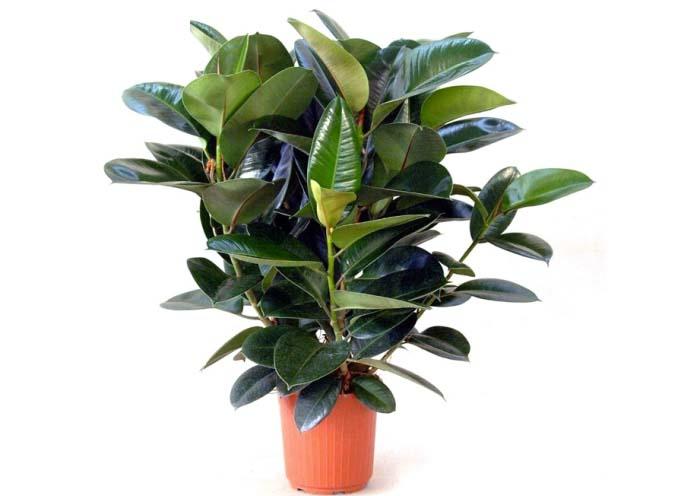

If the composition of the soil was not selected correctly, then white worms may appear in it. These are small white parasites, the body length of which does not exceed 2 mm. They are the larvae of mushroom gnats. White worms are very mobile. If they started up, it means that the soil was very waterlogged. Usually small white worms crawl in the upper layers of the substrate. When they start up, the pot needs to be treated with special insecticides (aktara, agravertin, decis, actellic, intavir and their analogues). You can make preparations in granules by mixing them with the top layer of the earth. In the presence of white worms, the treatment should be carried out twice with an interval of a week. When treated with insecticides, white larvae begin to float to the surface and die there.
After the white worms have been destroyed, just in case, transplant the flower into a new pot and completely replace the potting mix. In this case, it is imperative to monitor the watering so as not to flood the ficus again.
How to make a soil for ficuses
If you know these simple rules, you can prepare the soil for ficuses yourself, observing the following proportions:
For young ficuses
1 part leaf humus 1 part peat 1 part sand
For adult ficuses
Option 1
2 parts of leaf humus 2 parts of sod land 1 part of sand
Option 2
1 part leaf land 1 part turf land 1 part peat 1 part sand
To achieve looseness of the soil, add components such as expanded clay, coarse sand, charcoal.
Expanded clay gravel, in addition to contributing to better air permeability of the soil, like a sponge absorbs water and nutrient solutions, and then gradually shares this reserve with the root system of the plant.
Vermicompost - a product of the vital activity of earthworms is included in individual mixtures not only as an organic fertilizer, but also as a growth stimulant. Improves survival rate, accelerates plant adaptation during transplantation.
Lime and dolomite flour reduce the acidity of the soil. In addition, dolomite is a natural mineral that enriches the soil with calcium and magnesium, and the latter is involved in the formation of chlorophyll in the cells of all green plants.
Post-transplant care
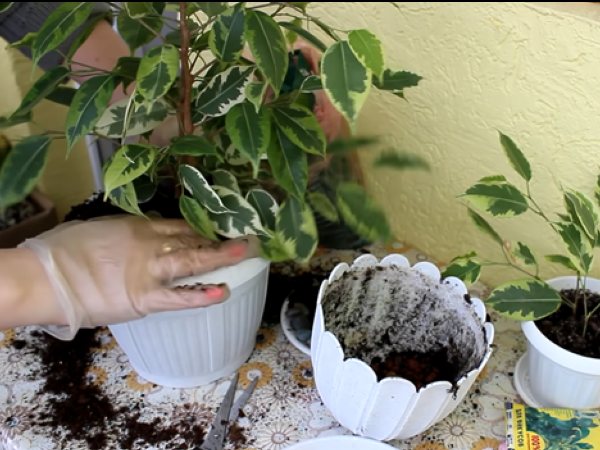

Ficus Benjamna after transplant
Freshly planted ficuses need care and attention, so they will take root faster and will hardly hurt.
Post-transplant care is as follows:
- For at least 2-3 days after the transplantation procedure, the flower is kept in light shade at + 22 ... + 24 ° C.
- They organize a kind of greenhouse, putting a plastic bag on top of the flower. Every day (as often as possible) they ventilate, removing the shelter for 20-30 minutes. As soon as the growing season resumes after transplanting, it is removed completely.
- The first thorough watering is done not earlier than the complete drying of the substrate in the container. Then the ficus is watered regularly as needed (you can add any root stimulant to the water for better survival).
- They start feeding Benjamin only a month after the transplant.Use any universal complexes for indoor crops (Kemira, Palma, Agricola, etc.).
Ready soil for ficuses
However, it often happens that it is not possible to purchase or prepare all the necessary components on time. In this case, you can easily use a ready-made soil mixture, different types of which are widely available for sale. It can be universal or intended for a specific type of indoor plants. There are potting mixes specially prepared for growing ficuses. The composition is different, depending on the manufacturer, but basically all modern manufacturers offer for growing ficuses not a soil mixture as such, but some inert substrate of peat, sand and other fillers that improve the structure of the soil. And so that the plants do not starve, complex mineral fertilizers of long-term action are included in the substrate without fail.
Below is a comparative table of special ready-made soils for ficuses from various domestic manufacturers.
| Product name and manufacturer | Structure | Nutrient content (not less) |
Ficus. Nutrient soil. Completely neutral ready-made.
"Garden of Miracles" / CJSC MNPP "Fart", St. Petersburg
A mixture of high-moor peats of various degrees of decomposition, refined river sand, vermicompost, complex mineral fertilizer.
mg / l:
Nitrogen (NH4 + NO3) - 200
Phosphorus (P2O5) - 350
Ficus soil.
"Vermion" / LLC "Compound" Albin ", Moscow
Peat, fine expanded clay, wood ash, dolomite flour, inert fillers, vermicompost.
mg / 100g dry matter:
Humic acids - 3%
Nutrient soil for ficuses ("Good" series)
"Seliger-Agro" / CJSC "Seliger-Holding", Tver
High-moor and lowland peat, expanded clay gravel, river sand, lime and complex fertilizer.
mg / l:
Soil for ficuses
"Flower happiness" / LLC "Fasko +", Moscow region, the city of Khimki
High-moor peat, low peat, sand, dolomite flour, expanded clay mineral fertilizers.
mg / 100g dry matter:
You can use Seramis from a German manufacturer. This is also a substrate, which is small clay granules. Thanks to the tiny pores, the granules easily absorb water, and then also easily give it away to even the smallest roots. Ceramix is durable, looks aesthetically pleasing, and is increasingly used in landscaping offices, hotels and other premises.
All offered ready-made soils contain various types of peat, sand and fine expanded clay, which improve the structure of the soil, as well as a complex of mineral fertilizers.
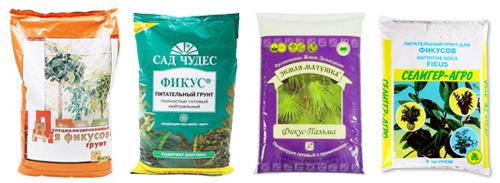

Knowing the composition of the soil mixture (and it is necessarily listed on the packaging of the purchased soil), it can be improved with additional additives - both immediately when planting a plant, and then in the process of its further growth.
Peat mixes are usually depleted and dry out quickly, and humus-containing mixes can cake and serve as a breeding ground for pests. Therefore, both self-prepared soil and purchased in a store will not hurt to process it with special chemicals, steam it or heat it in the oven. And in order to restore the soil microflora that died at the same time, it is recommended to then use special biological products.
How often to change the soil
Young ficuses should change the ground annually, picking up dishes 2-3 cm wider than the previous diameter. The transplant is carried out by the transshipment method, i.e. preserving as much as possible the old clod of earth along with the roots. For plants older than 4 years, transshipment is done in 2-3 years. In large specimens, the upper five-centimeter layer is replaced 1-2 times a year. When planting, a layer of drainage is laid on the bottom of the pot, for example, fine gravel, expanded clay or coarse sand with the addition of charcoal.
«>


